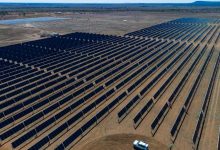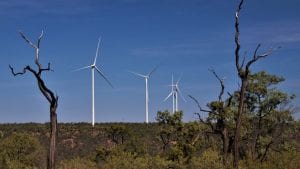Adani Renewables’ flagship solar project in Australia – the 65MW Rugby Run solar farm in central Queensland – has been stalled, and some say effectively mothballed, with nearly 250,000 solar modules installed last year sitting unused for the last 7 months.
All the mechanical components of the Rugby Run solar farm – located near Moranbah and around 100kms form the proposed Carmichael coal mine in the Galilee Basin – were completed in late October, including the modules, trackers, inverters and other equipment. But the project has been at a standstill since then as Adani seeks to resolve connection issues.
Rugby Run is one of two solar projects being pursued by Adani Renewables, which was established in 2016 in Australia to pursue solar projects, provide “sustainable” energy diversity and perhaps soften the image of the company pursuing one of the biggest and most controversial coal mines in the world.
The original plan was for Rugby Run to be upgraded to a 170MW project. The company’s other solar project is a planned 140MW facility at Whyalla, although it looks like being beaten to construction there by Sanjeev Gupta’s rival 280MW Cultana solar farm located right next door. Adani earlier this year raised concerns about the impact of that solar farm on local wildlife and vegetation.
 Adani promised last May that the Rugby Run solar farm will be operational by October last year. When the contracting firm EDMS finished construction in late October, Adani said it would be in full production by early this year. Its works include a new 132kW sub station.
Adani promised last May that the Rugby Run solar farm will be operational by October last year. When the contracting firm EDMS finished construction in late October, Adani said it would be in full production by early this year. Its works include a new 132kW sub station.
This was echoed by Adani Renewables Australia CEO, Dr Jennifer Purdie in a separate statement at the time: “With another major construction milestone under our belt, we’re now preparing for final works so that we can deliver our customers with energy from early next year,” Dr Purdie said in October.
In January, Adani said that “energisation” of its main transformer had been achieved. The company’s website still says that it will be “fully operational early 2019.” (See below).
But the project is still not generating, and has not even registered on the production systems for the leading NEM data analysts, and the latest estimated schedule from the Australian Energy Market Operator suggests a December completion date at the earliest.
However, it is not clear that Adani will meet that new deadline, given the complications around the generation performance standards imposed by the local network owner and AEMO, and the long lead times and “hold points” that are required at various levels of output.
It’s not easy to build a solar farm in Australia any more, as RenewEconomy reported last week, with many projects being hit by downgrades to their output due to changes in marginal loss factors , and/or have had to go back to the drawing board after their GPS modelling was rejected by local network operators, or the market operator.
Updating these complex modelling exercises can cost millions, and some projects have been told, even at the last moment, that they have to install equipment such as synchronous condensers (at the cost of tens of millions), if they want to finalise their connection and be fully commissioned.
On top of this, new solar projects in Queensland threaten to come to a standstill because of new state government rules that require only licensed electricians, or supervised apprentices, to handle solar panels on a site.
That new rule has been labelled as a crazy move by many in the industry, because of the added costs and delays that it will cause.Legal action is now being taken by one company – backed by billionaire Mike Cannon-Brookes, affected by the new rules, and is supported by the Clean Energy Council.
Adani signed a contract to deliver 80 per cent of the solar farm’s anticipated output of 185,000MWh a year to energy retailer Alinta, with the remaining 20 per cent to be sold on the spot market.
RenewEconomy sought comment from Adani and its senior executives but there was no response by the time of publication. A statement emailed on Wednesday morning said: “We are working through the relevant regulatory processes and will provide an update once they are concluded.”
Adani, meanwhile, has yet to announce any off take agreement for the Whyalla project.











